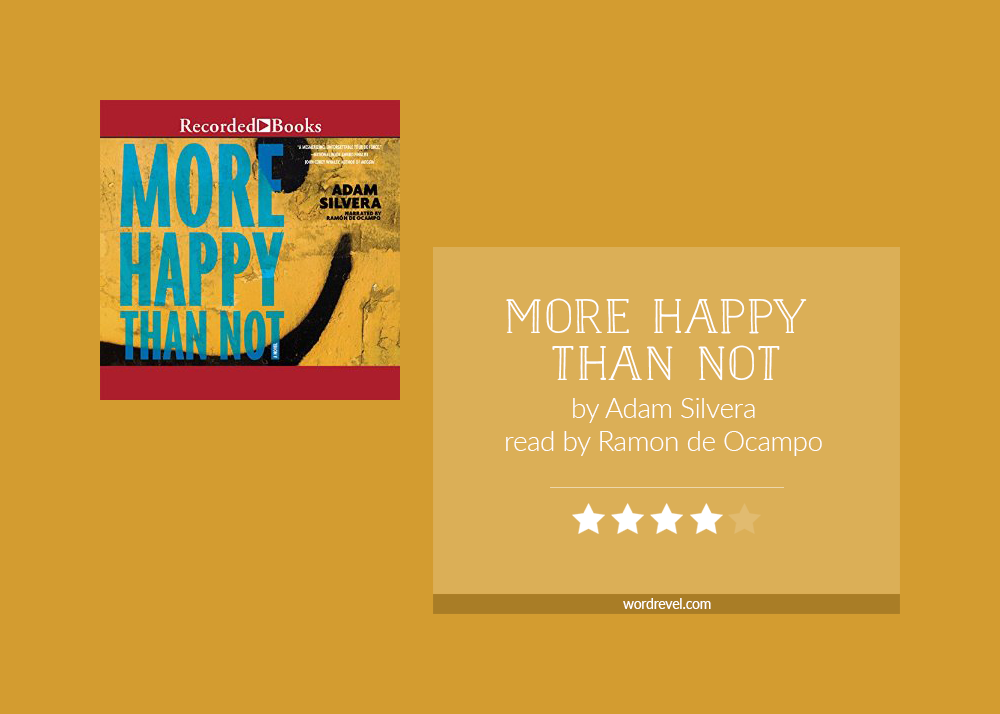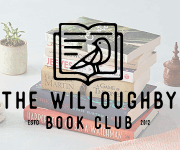 More Happy Than Not by Adam Silvera • read by Ramon de Ocampo for 8 hours and 25 minutes • published June 2, 2015 by Recorded Books • classified as LGBTQ, Science Fiction, Young Adult • obtained through Scribd • read as audiobook • shelve on Goodreads
More Happy Than Not by Adam Silvera • read by Ramon de Ocampo for 8 hours and 25 minutes • published June 2, 2015 by Recorded Books • classified as LGBTQ, Science Fiction, Young Adult • obtained through Scribd • read as audiobook • shelve on Goodreads Synopsis:
In the months after his father's suicide, it's been tough for sixteen-year-old Aaron Soto to find happiness again—but he's still gunning for it. With the support of his girlfriend Genevieve and his overworked mom, he's slowly remembering what that might feel like. But grief and the smile-shaped scar on his wrist prevent him from forgetting completely.
When Genevieve leaves for a couple of weeks, Aaron spends all his time hanging out with this new guy, Thomas. Aaron's crew notices, and they're not exactly thrilled. But Aaron can't deny the happiness Thomas brings or how Thomas makes him feel safe from himself, despite the tensions their friendship is stirring with his girlfriend and friends. Since Aaron can't stay away from Thomas or turn off his newfound feelings for him, he considers turning to the Leteo Institute's revolutionary memory-alteration procedure to straighten himself out, even if it means forgetting who he truly is.
Why does happiness have to be so hard?
How and Why I Listened to More Happy Than Not
For the month of February Hazel picked More Happy Than Not by Adam Silvera as her book recommendation for me to read. What made this round of Epic Recs different was that we specifically chose to go with audiobooks. This also meant that for once we didn’t pick books the other already owned, and so had free rein.
Thanks to the Scribd subscription I won last September, I was able to listen to it through the app. The only downside was that the fastest possible listening speed through the app is 1.5x. Usually I listen to audiobooks at 2x speed, so once in a while I found More Happy Than Not a little draggy.
Notion of Memory Alteration
The main draw for me was the effects of memory alteration — to what extent could it improve someone’s quality of life? On what grounds should such a procedure be permitted? This notion contributed to the speculative aspect of the novel but it’s an interesting philosophical dilemma too. If you had the option to erase every bad memory, would you do it? Yes or no?
Nature vs. Nurture
On the science fiction front though, I’d say More Happy Than Not wasn’t too heavy. In a way, stylistically and plot-wise, I’d consider it sort of a cross between contemporary fiction and science fiction. I say this because the debate surrounding LGBTQ is a very pressing one due to the division between the camps that maintain it’s nature and the ones that maintain it’s nurture.
Silvera took a very relatable approach with Aaron, showing his every thought and his struggles. Aaron had such a difficult time reconciling his father’s rejection of him as a gay son with his father’s suicide. He also tried to conform to societal pressure, dating Genevieve, who could match him very well, save for the fact that she was girl.
Emotive Storytelling
The transitions from denial to acceptance and everything in between were portrayed so vividly, I could easily picture the events unfold. More Happy Than Not was told from the third-person perspective, yet every character felt real. Aaron’s emotions were raw from start to finish. Genevieve showed such strength of character. Brendan, Aaron’s best friend, showed a great deal of multiplicity, in that one moment I liked him and the next I wanted to punch him. Thomas, Aaron’s other best friend, was sensitive and balanced the trio’s dynamics.
Overall, the characters were complex, varied and strong individuals. Besides the overarching plot, I wasn’t all too interested in the subplots, somehow. Though the characters as people kept me going, especially because they came across as real people.
Gut-wrenching Yet Hopeful
In the end, I think More Happy Than Not is a book everyone should read, regardless of their stance on LGBTQ. One might say it heavily favours the homosexuality as nature view. That might be hard for someone who believes in nurture to swallow. However, it’s an invaluable cautionary tale that reminds us that even if we disagree with someone, they’re still human. That’s what makes More Happy Than Not so gut-wrenching — Aaron suffered as a result of coming out.
Yet, as the title implies, there are rays of hope to be found in More Happy Than Not.

Wow, okay, I LOVE this breakdown! I’ve been a little fearful of More Happy Than Not, because people were VERY reluctant to share anything about the book other than “TEARS!”. I like to know a little bit more than that before I commit to it.
And now I do. And I’m absolutely committing to it.
This is honestly such a stunning way to review a book – or, in this case, an audiobook. (And I’m a doofus to whom it never occurred to listen to audiobooks at 2x speed. So YOU’VE OPENED MY EYES IN GENERAL and BLESS YOU!) And since I tend to cry NATURE, NATURE, NATURE when it comes to LGBTQ+ matters and thus alienate people, I loved that you took a neutral stance in recommending it. If this doesn’t get people to give the book a go, nothing will.
I’ve got this one on my TBR (still), but I’m really happy to see that you enjoyed it. I’m looking forward to meeting these characters more than ever now :)
I sooo want to read this. SOMEDAY. *wishes hopefully that library will get it in* I’ve heard it’s a bit dark/depressing? And the cover kind of makes me think of a demented Joker from Batman. xD BUT ANYWAY. I like the sound of that message it’s sending across, with the if we disagree with someone, they’re still human because omg yes.